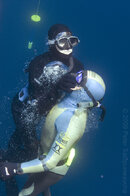There's one big difference between scuba and freediving: scuba emergencies are usually a slow-motion affair. Freediving emergencies happen in the blink of an eye.
For example,
deep water blackout presents as a perfectly normal ascent, with the freediver becoming unconscious at roughly 3 meters (15 fsw). There is no warning, either from the diver's experience - they usually feel perfectly fine right up to the point they black out. From the outside, they look like normal, and the blackout happens as if a light switch was pulled.
This is why a reputable class will teach you to escort your buddy to the surface from a depth of ~10 meters. Freediving, when done safely, is far more buddy-centric than scuba diving.
 A student rescues a "blacked out freediver" correctly during class. Note the nose and mouth are held closed - the opposite of a scuba rescue.
A student rescues a "blacked out freediver" correctly during class. Note the nose and mouth are held closed - the opposite of a scuba rescue.
In addition, a class teaches you the things to look for in yourself, that tell you you've pushed it too far, as well as the things you can see in your buddy that tell you they are on the verge of blackout.
The good thing is that the normal, untrained recreational freediver hasn't learned the extra techniques that allow them to extend their bottom times. Hence they are not usually at risk. But eventually, if they continue, they will pick up experience and tips, and get extra bottom time, and run the risk of becoming a statistic.
So, as far as the OP's question, do you
need to take a class? The answer is no, especially at the beginning. However, if you routinely start producing bottom times of more than 30 seconds, or push deeper than 10 meters (33 feet), do your loved ones a favor and take a quality class.
All the best, James





